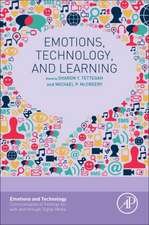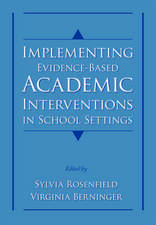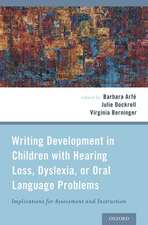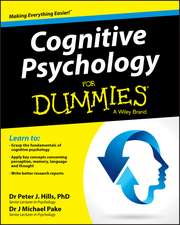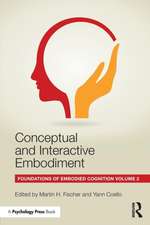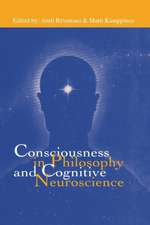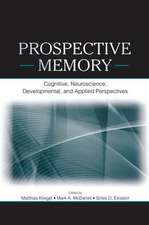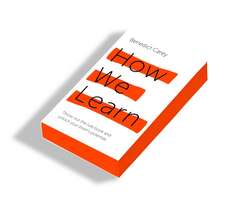Past, Present, and Future Contributions of Cognitive Writing Research to Cognitive Psychology
Editat de Virginia Wise Berningeren Limba Engleză Hardback – 13 oct 2011
Writing processes yield important insights into human cognition, and is increasingly becoming a mainstream topic of investigation in cognitive psychology and cognitive neuroscience. Technological advances have made it possible to study cognitive writing processes as writing unfolds in real time. This book provides an introduction to these technologies.
The first part of the volume provides the historical context for the significance of writing research for contemporary cognitive psychology and honors the pioneers in cognitive and social-cognitive research in this field. The book then explores the rapidly expanding work on the social foundations of cognitive processes in writing and considers not only gender differences but also gender similarities in writing. The third part presents a lifespan view of writing in early and middle childhood, adolescence, higher education, and the world of work. There follows an examination of the relationships of language processes –at the word, sentence, and text levels—to the cognitive processes in writing. Part V covers representative research on the cognitive processes of writing—translation and reviewing and revision—and the working memory mechanisms that support those processes. A review of the current technologies used to study these cognitive processes on-line as they happen in real time is provided. Part VII provides an introduction to the emerging new field of the cognitive neuroscience of writing made possible by the rapidly evolving brain imaging technologies, which are interpretable in reference to paradigms in cognitive psychology of writing. The final section of the book offers visions of the future of writing research from the perspective of contemporary leaders in writing research.
Preț: 1111.18 lei
Preț vechi: 1221.08 lei
-9% Nou
Puncte Express: 1667
Preț estimativ în valută:
212.62€ • 222.59$ • 175.93£
212.62€ • 222.59$ • 175.93£
Carte disponibilă
Livrare economică 17-31 martie
Livrare express 01-07 martie pentru 48.11 lei
Preluare comenzi: 021 569.72.76
Specificații
ISBN-13: 9781848729636
ISBN-10: 1848729634
Pagini: 652
Ilustrații: 42 b/w images and 23 tables
Dimensiuni: 152 x 229 x 36 mm
Greutate: 0.95 kg
Ediția:1
Editura: Taylor & Francis
Colecția Psychology Press
Locul publicării:Oxford, United Kingdom
ISBN-10: 1848729634
Pagini: 652
Ilustrații: 42 b/w images and 23 tables
Dimensiuni: 152 x 229 x 36 mm
Greutate: 0.95 kg
Ediția:1
Editura: Taylor & Francis
Colecția Psychology Press
Locul publicării:Oxford, United Kingdom
Cuprins
Part 1. The Cognitive Tradition in Writing Research. J.R. Hayes, My Past and Present as Writing Researcher and Thoughts about the Future of Writing Research. M. Fayol, Cognitive Processes of Children and Adults in Translating Thought into Written Language in Real Time: Perspectives from 30 Years of Programmatic Cognitive Psychology and Linguistics Research. P. Boscolo, Teacher-Based Writing Research. Part 2. The Socio-Cultural Plus Cognitive Traditions in Writing Research. C. Bazerman, Writing, Cognition, and Affect from the Perspectives of Socio- Cultural and Historical Studies of Writing. C. Beaudet, R. Graves, B. Labasse, Writing Under the Influence (of the Writing Process). P. Klein, T. Leacock, Distributed Cognition as a Framework for Understanding Writing. C. Gelati, Role of Gender Differences and Interest Factors in Writing: Female Superiority and Gender Similarity Effects. Part 3. The Changing Nature of Teaching, Learning, and Assessing Writing across the Life Span: K-12, Adolescence, Higher Education, and Work World. S. Graham, K.R. Harris, The Role of Strategies, Knowledge, Will, and Skills in a 30 Year Program of Writing Research. D. McCutchen, Phonological, Orthographic, and Morphological Word-Level Supporting Multiple Levels of the Writing Process. V. Connelly, J.E. Dockrell, A.L. Barnett, Children Challenged by Writing Due to Language and Motor Difficulties. D. Myhill, The Ordeal of Deliberate Choice: Metalinguistic Development in Secondary Writers. K. Schriver, What We Know about Expertise in Professional Communication. Part 4. Levels of Language Processes in Writing: Word, Sentence, and Text. P. Bonin, S. Roux, C. Barry, Translating Nonverbal Pictures into Verbal Word Names: Understanding Lexical Access and Retrieval. S. Pacton, H. Deacon, G. Borchardt, J. Danjon, M. Fayol, Are Writing Researchers Taking into Account Graphotactic and Morphological Regularities in Examining Spelling Acquisition? B. Arfé, B. De Bernardi, M. Pasini, F. Poeta, Toward a Re-Definition of Spelling in Shallow Orthographies: Phonological, Lexical, and Grammatical Skills in Learning to Spell Italian. R.A. Alves, M. Branco, S.L. Castro, T. Olive, Effects of Handwriting Skill, Output Modes, and Gender on Fourth Graders' Pauses, Language Bursts, Fluency, and Quality. M. Torrance, G. Nottbusch, Written Production of Single Words and Simple Sentences. A. Mazur-Palandre, M. Fayol, H. Jisa, Information Flow across Modalities and Text Types. Part 5. Cognitive Processes in Writing. D. Alamargot, C. Leuwers, G. Caporossi, V. Pontart, K. O’Brien-Ramirez, A. Pagan, D. Chesnet, M. Fayol, Eye Tracking Data during Written Recall: Clues to Subject-Verb Agreement Processing during Translation. C. MacArthur, Evaluation and Revision. T. Olive, Working Memory in Writing. Part 6. Applications of Technology to Studying and Teaching Writing. L. Van Waes, M. Leijten, Å. Wengelin, E. Lindgren, Logging Tools to Study Digital Writing Processes. Part 7. Emerging Cognitive Neuroscience of Writing. V. Berninger, T. Richards, The Writing Brain: Coordinating Sensory/Motor, Language, and Cognitive Systems in Working Memory. Visions of the Future of Writing Research: Perspectives from the New Generation of Writing Researchers and Contemporary Leaders. D. Alamargot, L. Chanquoy, Through the Models of Writing: Ten Years After and Vision for the Future. B. Arfé, Looking into the Text Generation Box with Vision for Future Writing Research. G. Rijlaarsdam, A. van den Bergh, Research Agendas for Moving the Writing Field Forward! P. Rogers, Evolving Integration and Differentiation in Cognitive and Socio-Cultural-Historical Writing Research. R. Alves, The Future Is Bright for Writing Research.
Recenzii
"Those who teach the art of writing and those who desire to improve their own writing skills will find this volume to be a valuable resource. This anthology of essays, written by a diverse group of international scholars, summarizes recent research on the psychological factors involved in the writing process and contains constructive suggestions on how to enhance writing abilities in the classroom. Teachers and researchers in the field of writing will find this book extremely useful in their work."- Richard Kellogg, Ph.D., Professor Emeritas, SUNY College of Technology, USA
"The field of writing research, as represented by cognitive psychology, is still relatively young, particularly when compared with the parallel field of research on reading. One of the real strengths of this book is the way in which it will map the territory historically, and provide a coherent overview of how writing research has developed. It will illustrate in a single volume how programmatic research has cumulatively developed our understanding of writing." - Debra Myhill, Ph.D., University of Exeter, United Kingdom
"I think that this book will certainly raise a lot of interest from the writing research community. The editor managed to bring together a large group of leading researchers in the field, and the fact that the book is a tribute to three famous pioneers in the domain of writing research certainly adds an extra value to this collection of research papers." - Luuk Van Waes, Ph.D., University of Antwerpen, Belgium
"The field of writing research, as represented by cognitive psychology, is still relatively young, particularly when compared with the parallel field of research on reading. One of the real strengths of this book is the way in which it will map the territory historically, and provide a coherent overview of how writing research has developed. It will illustrate in a single volume how programmatic research has cumulatively developed our understanding of writing." - Debra Myhill, Ph.D., University of Exeter, United Kingdom
"I think that this book will certainly raise a lot of interest from the writing research community. The editor managed to bring together a large group of leading researchers in the field, and the fact that the book is a tribute to three famous pioneers in the domain of writing research certainly adds an extra value to this collection of research papers." - Luuk Van Waes, Ph.D., University of Antwerpen, Belgium
Descriere
This volume tells the story of research on the cognitive processes of writing—from the perspectives of the early pioneers, the contemporary contributors, and visions of the future for the field. It includes the very latest in findings from neuroscience and experimental cognitive psychology, and provides the most comprehensive current overview on this topic.

